What you eat every day can have a profound effect on your physical and mental health. So often, people tend to think of what they should be avoiding for their health or waistlines, but a more productive way to approach food is to think of what they should be adding to their diet on a daily basis. The running theme throughout the list of healthy foods to add to eat every day is that all of these foods are plants or from plant sources.
Plants are rich sources of vitamins, minerals, phytonutrients, and fiber, and the variety of plant intake is just as important as the quantity of plant intake. Though it might seem daunting to consume nine different plants every day, half of these foods can be consumed together by adding them to one giant salad or blending them in a smoothie. Read on for the list of the healthy foods you should be eating every day.
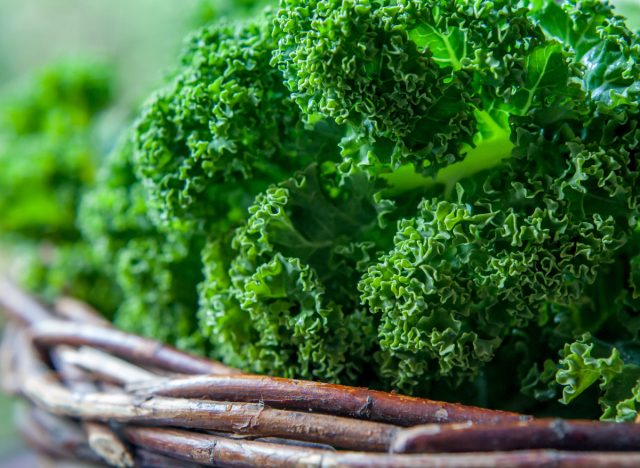

Per cup: 42.5 calories, 1.4 g fat (0 g saturated fat), 18.9 mg sodium, 6.3 g carbs (4.7 g fiber, 1.4 g sugar), 3.5 g protein
Kale’s popularity is here to stay, because this leafy green is packed with so much nutrition. In fact, one cup of kale contains 177 milligrams of bone-nourishing calcium. But calcium is not the only nutrient needed for bone health, as vitamin K is also necessary to support strong, healthy bones. Thankfully, 0ne cup of kale provides 493 micrograms of vitamin K. Chop kale up and massage it with olive oil and lemon for a delicious salad, or sauté it with loads of garlic for a yummy side dish—your bones will thank you.
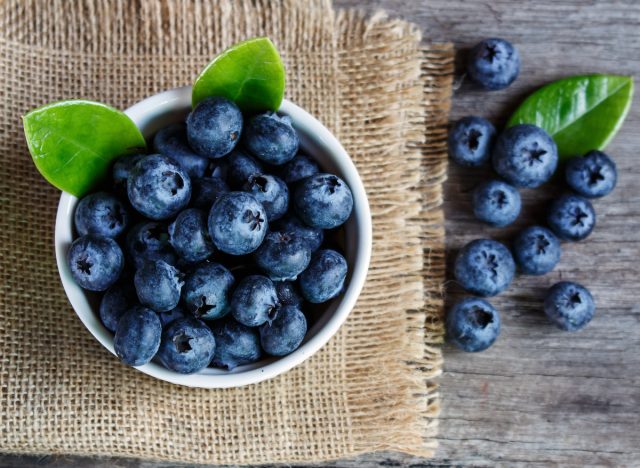

Per cup: 57 calories, 0.3 g fat (0 g saturated fat), 1 mg sodium, 14.5 g carbs (2.4 g fiber, 9.9 g sugar), 0.7 g protein
Blueberries have received a lot of attention over the years, and for good reason. This delicious fruit is packed with important chemical compounds found in plants called anthocyanins, polyphenols, and antioxidants. According to a 2018 review article in the International Journal of Molecular Sciences, “Blueberry can improve vision, is anticancer, antidiabetes, anti-obesity, is preventive against neurodegeneration and macular degeneration as well as osteoporosis, can reduce hyperlipidemia and hypertension, as well as heart disease […].” That is certainly one powerful fruit.
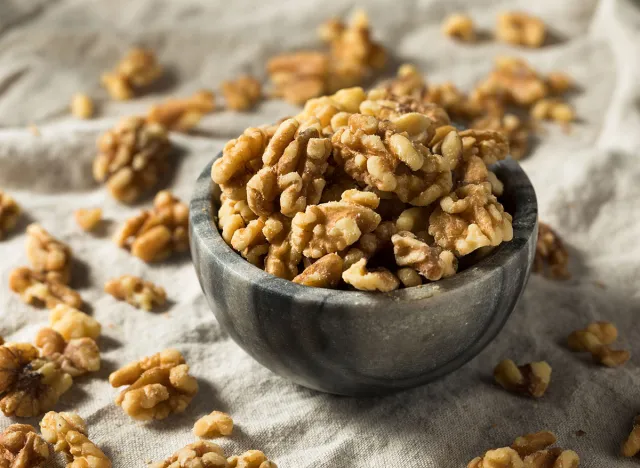

Per cup: 183 calories, 18.3 g fat (0 g saturated fat), 0.6 mg sodium, 3.8 g carbs (1.9 g fiber, 0.7 g sugar), 4.3 g protein
Is it a coincidence that walnuts look like mini brains, perhaps? Because truthfully, you can think of walnuts as food for your brain. Walnuts are very high in fat, but fortunately, it is a good type of fat known as α‐linolenic acid (ALA)—a type of omega-3 fatty acid. Omega-3 fatty acids have an anti-inflammatory effect and may be one of the reasons why walnuts are so good for cognition. In addition to being a good source of ALA, walnuts (as well as almonds and hazelnuts) have been shown to increase an incredible protein, brain-derived neurotrophic factor, that contributes to the production of new brain cells.
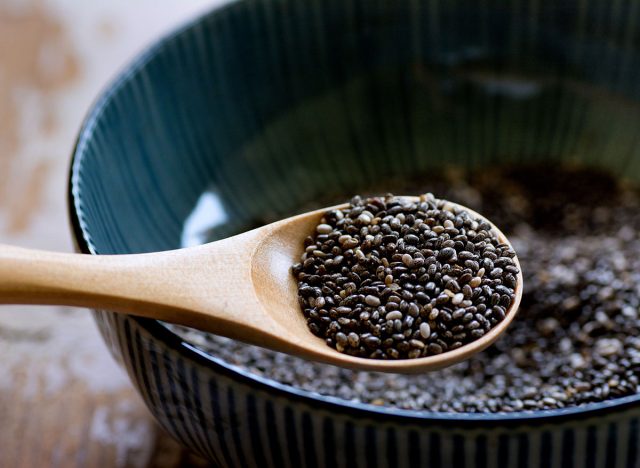

Per ounce: 183 calories, 8.7 g fat (0 g saturated fat), 4.5 mg sodium, 11.9 g carbs (9.6 g fiber, 0 g sugar), 4.7 g protein
Across the board, fiber intake is low in the United States. The USDA’s Dietary Guidelines for Americans suggest that adult women under 50 should consume 25 to 28 grams of fiber per day, and men under 50 should aim to consume 31 to 34 grams of fiber daily. However, Americans seem to only eat half of this amount. Fiber is important for maintaining gut health, stabilizing blood sugar, and lowering cholesterol. One serving of chia seeds not only covers almost a third of fiber needs for the day, but it is rich in antioxidants that can have protective effects against chronic disease. Chia can be added to oatmeal, smoothies, yogurt, or even made into a pudding.
READ RELATED: 9 Unhealthiest Ice Cream Pints You Should Never Buy


Per cup: 41.4 calories, 0.5 g fat (0 g saturated fat), 551 mg sodium, 6.8 g carbs (4.3 g fiber, 0.8 g sugar), 5.6 g protein
Similar to kale, spinach is a dark leafy green that is rich in a variety of nutrients including vitamin K, calcium, and vitamin C. In addition to being a nutrient powerhouse, spinach can have beneficial effects on heart health due to its nitrate content. Nitrates are helpful for individuals with hypertension, as they can aid in the dilation of blood vessels. A 2015 randomized clinical control trial published in the journal Clinical Nutrition Research found that consuming a meal rich in nitrates from spinach helped with vasodilation (dilation of blood vessels) and decreased blood pressure in the short term.


Per cup: 64 calories, 0.8 g fat (0 g saturated fat), 1.2 mg sodium, 14.6 g carbs (8 g fiber, 5.4 g sugar), 1.5 g protein
Like blueberries, raspberries are an incredibly nutrient-dense fruit. Their nutrient profile is similar to blueberries, but they are one of the richest sources of fiber across the plant kingdom—making them an excellent addition to your list of healthy foods to eat every day. Adding 1 cup of raspberries to your morning yogurt bowl will jumpstart you on your way to meeting your fiber needs for the day. Although research in humans is limited on how raspberries themselves affect or prevent chronic disease, increasing the amount of raspberries (and berries) you eat will help you increase your antioxidant intake, which is a critical part of disease prevention.
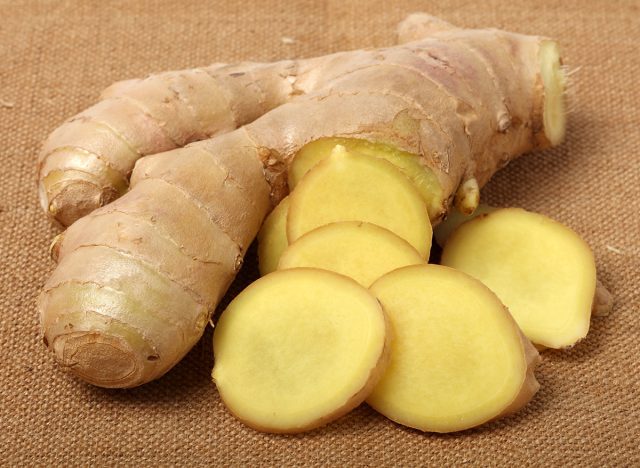

Per 5 slices: 8.8 calories, <0.1 g fat (0 g saturated fat), 1.43 mg sodium, 1.9 g carbs (0.2 g fiber, 0.2 g sugar), 0.2 g protein
Ginger has served as a staple ingredient in Chinese and Ayurvedic medicine for thousands of years, and ginger can not only make a meal taste amazing, but it works wonders for nausea, digestion, and helps fight inflammation. One 2017 research study published in the International Journal of Endocrinology and Metabolism found that ginger helped reduce fasting blood glucose and hemoglobin A1c in patients with type 2 diabetes. Ginger can be consumed as a tea, used in cooking, or added to a smoothie or soup.
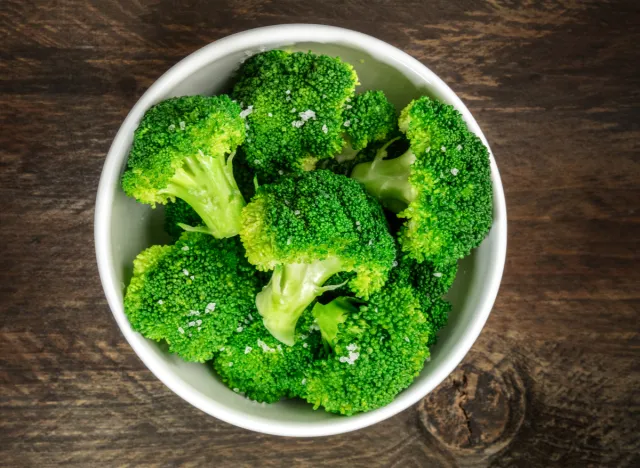

Per cup: 19.4 calories, 0.6 g fat (0 g saturated fat), 6.2 mg sodium, 3.4 g carbs (2.2 g fiber, 0.7 g sugar), 1 g protein
Broccoli is a powerful vegetable and its health benefits are vast. For instance, it is rich in a robust plant compound known as Sulforaphane. Sulforaphane helps fight inflammation, protects DNA, and may even slow tumor growth. Of course, broccoli alone cannot prevent or treat cancer, but including it daily will have protective effects.


Per tablespoon: 119 calories, 13.5 g fat (0 g saturated fat), 0.3 mg sodium, 0 g carbs (0 g fiber, 0 g sugar), 0 g protein
Permission granted to ditch your zero-calorie cooking sprays, because including olive oil in your list of healthy foods to eat every day can have tremendously beneficial effects on your health. Not only does olive oil add satisfying healthy fats to a dish, but emerging research shows olive oil can play a role in slowing cognitive decline. In addition to supporting brain health, a 2020 paper published in the New England Journal of Medicine showed there was a lower incidence of cardiac events in individuals with high cardiovascular risk when a Mediterranean diet supplemented with olive oil was consumed over a reduced-fat diet.
At the end of the day, you do not need to beat yourself up if you do not include all nine of these foods in your diet every single day. If you do not eat any of these foods, start by adding one new food per week and then work your way up from there. Remember, building healthy nutrition habits is all about progress, not perfection.











